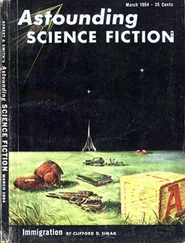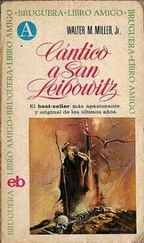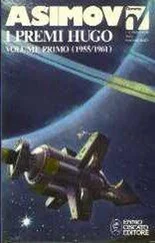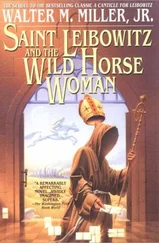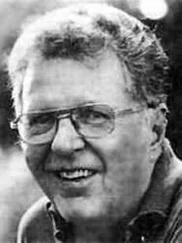The note seemed hasty gibberish to Brother Francis, who was at the moment too excited to concentrate on any single item more than the rest. After a final sneer at the notewriter’s hasty scrawl, he began the task of removing the trayracks to get at the papers in the bottom of the box. The trays were mounted on a swinging linkage which was obviously meant to swing the trays out of the box in stair-step array, but the pins were rusted fast, and Francis found it necessary to pry them out with a short steel tool from one of the tray compartments.
When Brother Francis had removed the last tray, he touched the papers reverently: only a handful of folded documents here, and yet a treasure; for they had escaped the angry flames of the Simplification, wherein even sacred writings had curled, blackened, and withered into smoke while ignorant mobs howled and hailed it a triumph. He handled the papers as one might handle holy things, shielding them from the wind with his habit, for all were brittle and cracked from age. There was a sheaf of rough sketches and diagrams. There were hand-scribbled notes, two large folded papers, and a small book entitled Memo.
First he examined the jotted notes. They were scrawled by the same hand that had written the note glued to the lid, and the penmanship was no less abominable. Poundpastrami, said one note, can kraut, six bagels, — bring home for Emma. Another reminded: Remember-pick up Form 1040, Uncle Revenue. Another was only a column of figures with a circled total from which a second amount was subtracted and finally a percentage taken, followed by the word damn! Brother Francis checked the figures; he could find no fault with the abominable penman’s arithmetic at least, although he could deduce nothing about what the quantities might represent.
Memo, he handled with special reverence, because its title was suggestive of “Memorabilia.” Before opening it, he crossed himself and murmured the Blessing of Texts. But the small book proved a disappointment. He had expected printed matter, but found only a hand-written list of names, places, numbers and dates. The dates ranged through the latter part of the fifth decade, and earlier part of the sixth decade, twentieth century. Again it was affirmed! — the contents of the shelter came from the twilight period of the Age of Enlightenment. An important discovery indeed.
Of the larger folded papers, one was tightly rolled as well, and it began to fall apart when he tried to unroll it; he could make out the words RACING FORM, but nothing more. After returning it to the box for later restorative work, he turned to the second folded document; its creases were so brittle that he dared inspect only a little of it, by parting the folds slightly and peering between them.
A diagram, it seemed, but — a diagram of white lines on dark paper!
Again he felt the thrill of discovery. It was dearly a blueprint! — and there was not a single original blueprint left at the abbey, but only inked facsimiles of several such prints. The originals had faded long ago from overexposure to light. Never before had Francis seen an original, although he had seen enough hand-painted reproductions to recognize it as a blueprint, which, while stained and faded, remained legible after so many centuries because of the total darkness and low humidity in the shelter. He turned the document over — and felt brief fury. What idiot had desecrated the priceless paper? Someone had sketched absent-minded geometrical figures and childish cartoon faces all over the back. What thoughtless vandal —
The anger passed after a moment’s reflection. At the time of the deed, blueprints had probably been as common as weeds, and the owner of the box the probable culprit. He shielded the print from the sun with his own shadow while trying to unfold it further. In the lower right-hand corner was a printed rectangle containing, in simple block letters, various titles, dates, “patent numbers,” reference numbers, and names. His eye traveled down the list until it encountered:
“CIRCUIT DESIGN BY: Leibowitz, I. E.”
He closed his eyes tightly and shook his head until it seemed to rattle. Then he looked again. There it was, quite plainly:
CIRCUIT DESIGN BY: Leibowitz, I. E.
He flipped the paper over again. Among the geometric figures and childish sketches, dearly stamped in purple ink, was the form:
The name was written in a clear feminine hand, not in the hasty scrawl of the other notes. He looked again at the initialed signature of the note in the lid of the box: I. E. L. — and again at “CIRCUIT DESIGN BY…” And the same initials appeared elsewhere throughout the notes.
There had been argument, all highly conjectural, about whether the beatified founder of the Order, if finally canonized, should be addressed as Saint Isaac or as Saint Edward. Some even favored Saint Leibowitz as the proper address, since the Beatus had, until the present, been referred to by his surname.
“Beate Leibowitz, ora pro me!” whispered Brother Francis. His hands were trembling so violently that they threatened to ruin the brittle documents.
He had uncovered relics of the Saint.
Of course, New Rome had not yet proclaimed that Leibowitz was a saint, but Brother Francis was so convinced of it that he made bold to add: “Sancte Leibowitz, ora pro me!” Brother Francis wasted no idle logic in leaping to his immediate conclusion: he had just been granted a token of his vocation by Heaven itself. He had found what he had been sent into the desert to find, as Brother Francis saw it. He was called to be a professed monk of the Order.
Forgetting his abbot’s stem warning against expecting a vocation to come in any spectacular or miraculous form the novice knelt in the sand to pray his thanks and to offer a few decades of the rosary for the intentions of the old pilgrim who had pointed out the rock leading to the shelter. May you find your Voice soon, boy, the wanderer had said. Not until now did the novice suspect that the pilgrim meant Voice with a capital V.
“Ut solius tuae voluntatis mihi cupidus sim, et vocationis tuae conscius, si digneris me vocare…
It would be left to the abbot to think that his “voice” was speaking the language of circumstances and not the language of cause and effect. It would be left to the Promotor Fidei to think that “Leibowitz,” perhaps, was not an uncommon name before the Flame Deluge, and that I. E. could as easily represent “Ichabod Ebenezer” as “Isaac Edward.” For Francis, there was only one.
From the distant abbey, three bell notes rang out across the desert, a pause, then the three notes were followed by nine.
“Angelus Domini nuntiavit Mariae,” the novice dutifully responded glancing up in surprise to see that the sun had become a fat scarlet ellipse that already touched the western horizon. The rock barrier around his burrow was not yet complete.
As soon as the Angelus was said, he hastily repacked the papers in the rusty old box. A call from Heaven did not necessarily involve charismata for subduing wild beasts or befriending hungry wolves.
By the time twilight had faded and the stars had appeared, his makeshift shelter was as well fortified as he could make it; whether it was wolf-proof remained to be tested. The test would not be long in coming. He had already heard a few howls from the west. His fire was rekindled, but there was no light left outside the circle of firelight to permit the gathering of his dally collection of purple cactus fruit — his only source of nourishment except on Sundays, when a few handfuls of parched corn were sent from the abbey after a priest had made his rounds with the Holy Sacrament. The letter of the rule for a Lenten vocational vigil was not so strict as its practical application. As applied, the rule amounted to simple starvation.
Читать дальше

